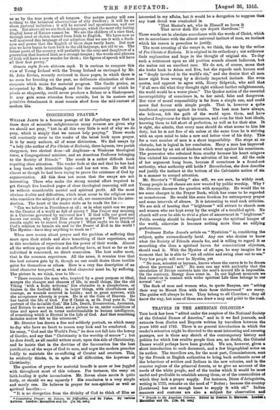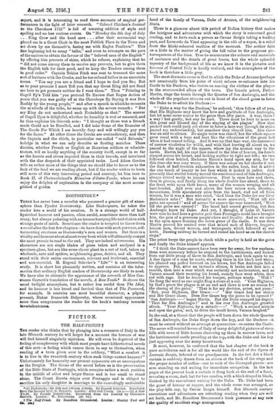TRAVELS IN THE AMERICAN COLONIES.*
Tires book has been "edited under the auspices of the National Society of the Colonial Dames of America," and in it we find journals, and extracts from diaries and Reports written by travellers between the years 1690 and 1783. There is no general introduction in which the reader's attention might be directed to the most interesting and amusing passages, nor is there any sketch of the contemporary history and polities for which less erudite people than are, no doubt, the Colonial Dames would perhaps have been grateful. We are, however, given a short introduction to each document, and a few biographical notes On its author. The travellers are, for the most part, Commissioners, sent by the French or English authorities to bring back authentic news of the behaviour of settlers and Indians in the new colonies, and in the remoter regions of the primeval forests, or to give an account of the needs of the white people, and of the trades which It would be moat useful and profitable to establish among them, or of the commodities of which they lack a proper supply. For Instance, Diron d'Artaguiettee writing in 1722, remarks on the need of " Butter ; because the country [Louisiana] has not enough bears to supply it with oil." Indian manners and customs are also a subject for observation and • Travels in the American Colonies. Rdited by Newton D. Mamma, Landau A Macmillan and 40. MS. 04. as4.1 report, and It is interesting to read these accounts of magical per- formances in the light of later research. "Colonel Chicken's Journal to the Cherokees 1725" is full of amusing oddities of style and spelling and no less curious events. On "Munday the 5th day of July , . King Crow and the head men. . . after their ceremonial way placed me in a Great Chair in the most niblick Place in the Town and set down by sue themselv's, facing me with Eagles Feathers." This ease beginning led to many "talks," and even to attempts on the part of the natives to obtain the favour of the" beloved man of the English" by offering him presents of skins, which he refuses, explaining that he "did not come among them to receive any presents, but to give them the English talk for their good, and to keep the Traders among them in good order." Captain Tobias Fitch was sent to transact the same sort of business with the Creeks, and he too refused bribes in no uncertain terms. " You say you are a friend and I hope to find you So ; But as to your presents I must Tell you that my Great King did not Send me here to get presents neither do I vent them." Then "Pointing to Gegen Ey's Told him you pretend To Excuse that Rogue Action of yours that you was guilty off at the Cherokeys By Saying it was Don Rashly by the young people,' and after a speech in which he recounts the ncsdeeds of the tribe, he sums up with the severe remark "But my King do not understand such Freindahip as that." The answer of Gegen Eyes is delightful, whether its humility is real or assumed, and he thus explains his thievish acts : "I thought as there was a Breach made Could not be Recalled, and I did take Some of the Remains of The Goods For Which I am heartily Sory and will willingly pay you for the Same." At other times the Creeks are contradictory, and then the Captain and the chiefs, In particular one called "081d Briumis," Indulge in what we can only describe as flouting matches. These diarists, whether French or English or Moravian soldiers or ad-ninia- trators, tell us hardly anything of the country itself, except in so far as the forests and rivers impeded them in their travels, and interfered with the due despatch of their appointed tasks. Lord Adam Gordon tells us rather more of the things that we should like to know as to the look of the land we are reading about, but if the reader wishes to learn still more of this very interesting period and country, let him turn to Book U. of Chateaubriand's .}Unwires d'Otare-Totsbe, where he can enjoy the delights of exploration in the company of the most accom- plished of guides.



























 Previous page
Previous page